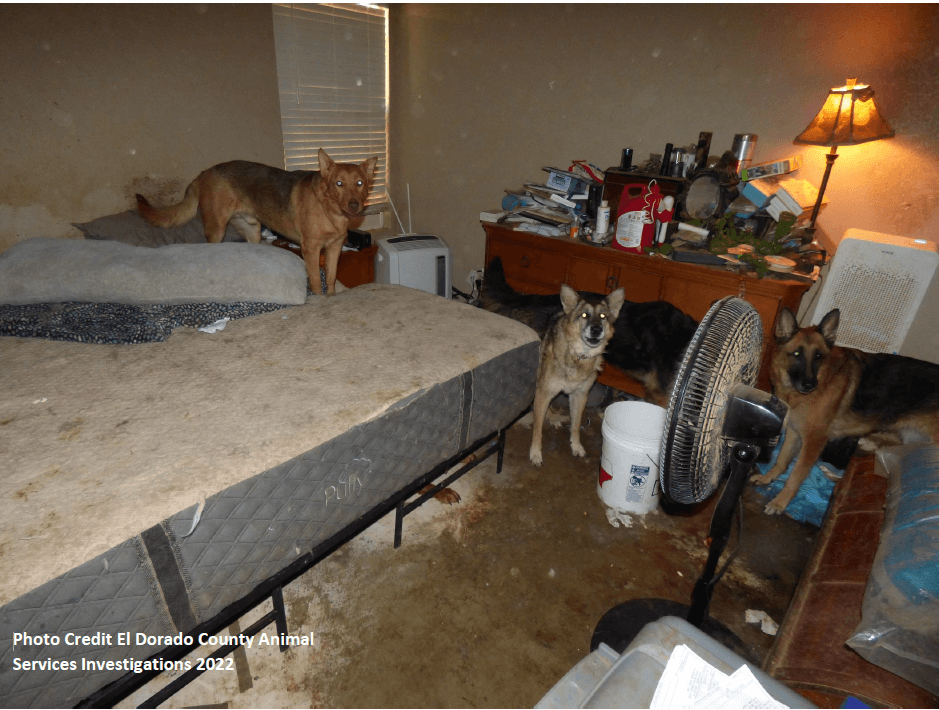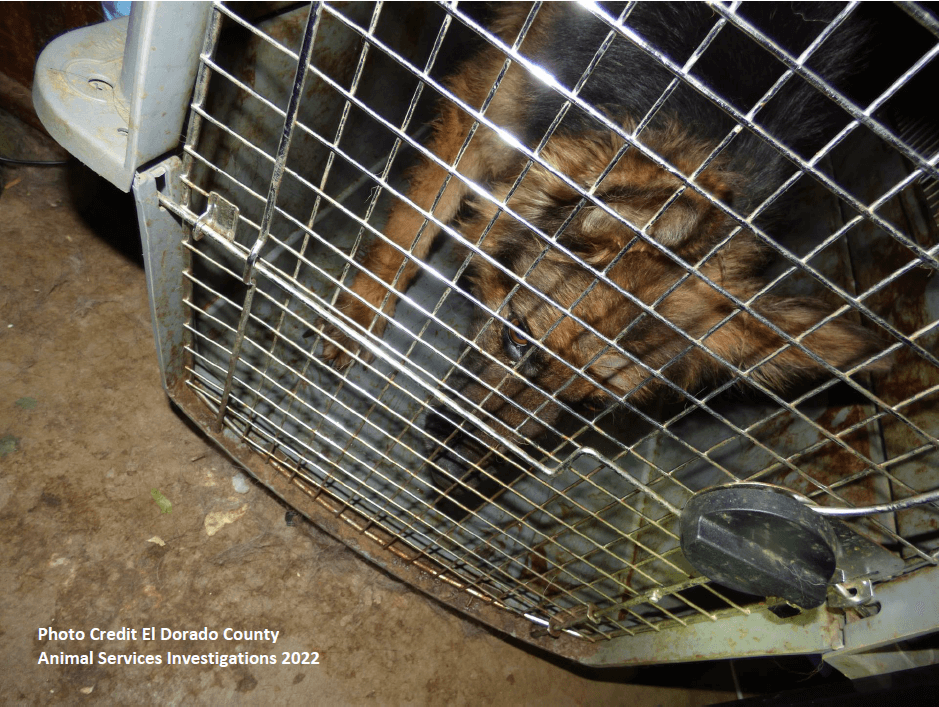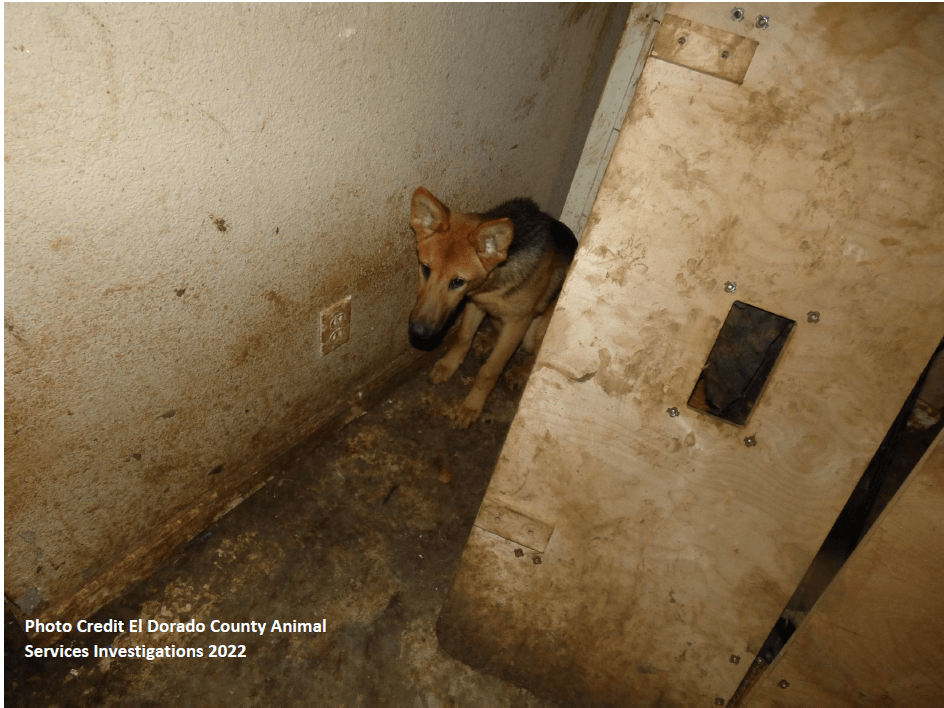‘It’s a Crisis’: PETA Talks to an Animal Control Chief About Hoarding in the ‘Rescue’ Industry
Animal control officers and sheriff’s deputies steeled themselves as they opened the door: Neighbors had complained about an odor of feces emanating from the residence, and now, armed with a search warrant, authorities were about to discover its source.
Inside, the stench was so overpowering that one detective gagged and had to rush back out to avoid vomiting. The floor was soggy with urine and piles of feces, and even the walls were smeared with waste. Windows had been blacked out—presumably so that no one could see the horrors hidden within.
Forced to breathe, sleep, eat, and relieve themselves in this disgusting mess were multiple large-breed dogs and puppies—25 in all, including some who had already died by the time investigators found them. Some were locked in crates, with no way to escape their own waste. Others were malnourished, riddled with parasites, and dirty, with matted fur or overgrown nails and injuries from fighting over food. Many of their water bowls were full of urine.
Welcome to Sierra Nevada German Shepherd Rescue.
Yes, you read that correctly. The woman who hoarded and severely neglected these dogs was running a self-proclaimed “rescue.” Following the raid, she pleaded guilty to felony cruelty-to-animals charges and was sentenced to jail time, community service, and a 10-year ban on possessing animals, among other conditions.
‘Rescues’ Hoarding Animals: A Nationwide Crisis
PETA obtained crime scene photos of this hellhole, and the horrors they reveal are, sadly, not uncommon. Nearly every week brings another report of animals suffering and dying slowly and painfully of diseases or untreated and unnoticed infections, from starvation, of injuries sustained in fights, or from other horrific forms of neglect at self-professed “rescues.”
El Dorado County Animal Services Chief Henry Brzezinski, who led the investigation into Sierra Nevada German Shepherd Rescue, has seen many situations like this one firsthand. In a recent interview on The PETA Podcast, the 35-year animal sheltering and control veteran called the problem of “rescues” hoarding animals “a crisis.” His department alone busts a “rescue hoarder” nearly every other month. “They’re out there, and they’re all over the place,” he remarks.
Listen to his full interview:
In another heartbreaking case, Brzezinski recounts, a hoarder had “rescued” a dog from an unhoused person. Both the dog’s front legs were broken, but the hoarder hadn’t provided veterinary treatment or euthanasia to end his suffering—she simply left him to wallow in feces. “It was just appalling to see this poor dog living there,” Brzezinski recalls.
How Some Shelters Fuel Hoarding Hell
What drives many horrific situations like these? Animal shelters—the very facilities that should be protecting vulnerable animals by keeping them out of the hands of abusers—often supply hoarders with victims. Shelters that become fixated on achieving or maintaining “high save rates” and “no-kill” status are notorious for recklessly sending animals out the door at any cost—even if that means handing them over to hoarders or condemning them to another cruel fate.
As Brzezinski explains, most shelters are overflowing with animals, so when a hoarder shows up claiming to be from a “rescue” and offering to “pull” animals from the shelter, there’s a serious danger that staffers will be bamboozled into thinking, “This person’s great—they’re going to take a bunch of cats and dogs off our hands.” If shelters don’t take the time to investigate such claims thoroughly, they’re putting every animal they hand over at extreme risk of being subjected to suffering and a miserable death, just like the dogs at Sierra Nevada German Shepherd Rescue.
That’s why, as Brzezinski explains, it’s vital for all shelters to have safeguards in place to protect animals, including thoroughly evaluating any “rescues” they work with to observe how they house and care for animals, the number of animals they have, and whether they have the necessary permits.
Don’t Unwittingly Support Hoarders
Thanks to the work of Brzezinski and his department, the dogs who were languishing at Sierra Nevada German Shepherd Rescue have now actually been rescued and given the veterinary care they desperately needed. Finally, they can experience basic comforts and the joys they’d long been denied, like feeling the sun on their faces and breathing fresh air.
“No animal should have to endure what these poor dogs endured,” says Brzezinski. And each of us must do our part to make sure we aren’t unwittingly supporting similar cruelty. Please never donate to, leave animals with, “like” on social media, or otherwise promote any “rescue” group or shelter that you haven’t personally visited and evaluated to ensure that it’s treating animals humanely and acting responsibly. See PETA’s guidelines for operating a humane shelter for advice on what to look for when assessing a facility. Support your community’s animal control officers—real heroes who truly rescue animals, including those who have been abused by self-proclaimed animal “rescues.”
And please help end the connected crises of animal overpopulation, homelessness, and hoarding at their source by always having your animal companions spayed or neutered, helping everyone you know to do the same, lobbying for spay/neuter ordinances, and working to end the sale of animals by breeders and pet stores. Preventing unwanted animals from being born in the first place is the single most important thing we can do to prevent them from ending up homeless or hoarded.



